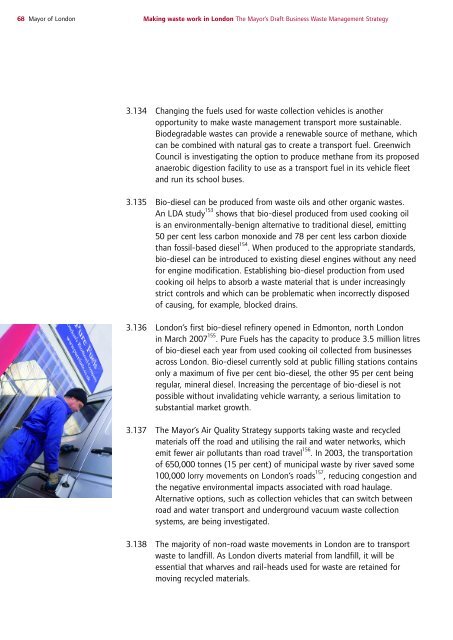Draft Business Waste Strategy PDF - london.gov.uk - Greater ...
Draft Business Waste Strategy PDF - london.gov.uk - Greater ...
Draft Business Waste Strategy PDF - london.gov.uk - Greater ...
Create successful ePaper yourself
Turn your PDF publications into a flip-book with our unique Google optimized e-Paper software.
68 Mayor of London<br />
Making waste work in London The Mayor’s <strong>Draft</strong> <strong>Business</strong> <strong>Waste</strong> Management <strong>Strategy</strong><br />
3.134 Changing the fuels used for waste collection vehicles is another<br />
opportunity to make waste management transport more sustainable.<br />
Biodegradable wastes can provide a renewable source of methane, which<br />
can be combined with natural gas to create a transport fuel. Greenwich<br />
Council is investigating the option to produce methane from its proposed<br />
anaerobic digestion facility to use as a transport fuel in its vehicle fleet<br />
and run its school buses.<br />
3.135 Bio-diesel can be produced from waste oils and other organic wastes.<br />
An LDA study 153 shows that bio-diesel produced from used cooking oil<br />
is an environmentally-benign alternative to traditional diesel, emitting<br />
50 per cent less carbon monoxide and 78 per cent less carbon dioxide<br />
than fossil-based diesel 154 . When produced to the appropriate standards,<br />
bio-diesel can be introduced to existing diesel engines without any need<br />
for engine modification. Establishing bio-diesel production from used<br />
cooking oil helps to absorb a waste material that is under increasingly<br />
strict controls and which can be problematic when incorrectly disposed<br />
of causing, for example, blocked drains.<br />
3.136 London’s first bio-diesel refinery opened in Edmonton, north London<br />
in March 2007 155 . Pure Fuels has the capacity to produce 3.5 million litres<br />
of bio-diesel each year from used cooking oil collected from businesses<br />
across London. Bio-diesel currently sold at public filling stations contains<br />
only a maximum of five per cent bio-diesel, the other 95 per cent being<br />
regular, mineral diesel. Increasing the percentage of bio-diesel is not<br />
possible without invalidating vehicle warranty, a serious limitation to<br />
substantial market growth.<br />
3.137 The Mayor’s Air Quality <strong>Strategy</strong> supports taking waste and recycled<br />
materials off the road and utilising the rail and water networks, which<br />
emit fewer air pollutants than road travel 156 . In 2003, the transportation<br />
of 650,000 tonnes (15 per cent) of municipal waste by river saved some<br />
100,000 lorry movements on London’s roads 157 , reducing congestion and<br />
the negative environmental impacts associated with road haulage.<br />
Alternative options, such as collection vehicles that can switch between<br />
road and water transport and underground vacuum waste collection<br />
systems, are being investigated.<br />
3.138 The majority of non-road waste movements in London are to transport<br />
waste to landfill. As London diverts material from landfill, it will be<br />
essential that wharves and rail-heads used for waste are retained for<br />
moving recycled materials.
















